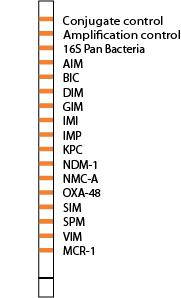For initial screening for the most common carbapenemases
The emergence and spread of carbapenem-hydrolysing ß-lactamases amongst gram-negative bacteria over the past decade represents a serious issue in the hospital environment. This fact is worrying, especially because these enzymes also hydrolyse almost all antimicrobial ß-lactams and often are also resistant to commercially available ß-lactamase inhibitors.
Enterobacteriaceae show a wide variety of carbapenemase genes. These are widely spread especially in Escherichia coli und Klebsiella pneumoniae, but can be detected also in many other species like Pseudomonas aeruginosa or Acinetobacter baumannii.
The worldwide most important carbapenemases are the Klebsiella pneumoniae carbapenemase KPC, the Verona Integron Metallobetalaktamase (VIM), the New Dheli metallo beta lactamase (NDM) and OXA-48. In Germany, OXA-48 is the most predominant carbapenemase followed by KPC and VIM-1. Also an increasing detection of NDM-1 was observed in the last years.
Bacterial strains that have developed resistance to the antibiotic of the last resort colistin, caused by the resitance gene mcr-1, have been incresingly reported for some years in Germany and other European countries.
- Developed for an initial screening of the most frequent carbapenemases with one single test
- Single detection of 13 different carbapenem-resistances plus colistin resistance gene and control bands: conjugate control, amplification control, 16S pan bacterial control
- Specimen: bacterial culture, urine
- Results within 4 hours
- Suited for automated systems
- Control bands on every strip shows correct DNA isolation, amplification and hybridization
- Evaluation and documentation with AID scanner and software
- Art.no.: RDB 2290



 deutsch
deutsch english
english
